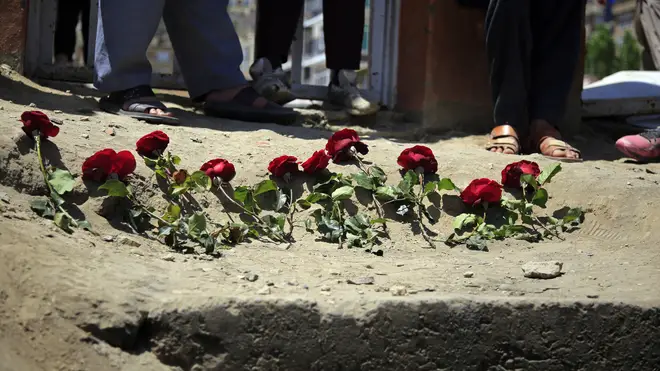
Vanessa Feltz 3pm - 6pm
9 May 2021, 16:04

The number of wounded in Saturday’s attack climbed to more than 100.
Grieving families buried their relatives following a bombing at a girls’ school in the Afghan capital that killed 50 people, many of them pupils between 11 and 15 years old.
The number of wounded in Saturday’s attack climbed to more than 100, said Interior Ministry spokesman Tariq Arian.
Three explosions outside the school entrance struck as students were leaving for the day, said Mr Arian.
The blasts targeted Afghanistan’s ethnic Hazaras who dominate the Dasht-e-Barchi neighbourhood, where the bombings occurred. Most Hazaras are Shiite Muslims. The Taliban denied responsibility, condemning the attack and the many deaths.
The first explosion came from a vehicle packed with explosives, followed by two others, said Mr Arian, adding that the casualty figures could still rise.
In the capital rattled by relentless bombings, Saturday’s attack was among the worst.
Criticism has mounted over lack of security and growing fears of even more violence as the US and Nato complete their final military withdrawal from Afghanistan.
At Vatican City, in his traditional Sunday remarks to faithful in St Peter’s Square, Pope Francis cited the bombing.
“Let us pray for the victims of the terrorist attack in Kabul, an inhumane action that struck so many girls as they were coming out of school,” he said.
The pontiff then added: “May God give Afghanistan peace.”

The Dasht-e-Barchi area has been hit by several incidents of violence targeting minority Shiites and most often claimed by the so-called Islamic State affiliate operating in the country. No one has yet claimed Saturday’s bombings.
On Sunday, Hazara leaders from Dasht-e- Barchi met to express their frustration with the government failure to protect ethnic Hazaras, deciding to cobble together a protection force of their own from among the Hazara community.
The force would be deployed outside schools, mosques and public facilities and would cooperate with government security forces. The intention is to supplement the local forces, said Parliamentarian Ghulam Hussein Naseri.
The meeting participants decided that “there is not any other way, except for people themselves to provide their own security alongside of the security forces,” said Mr Naseri, who added that the government should provide local Hazaras with weapons.
Mr Naseri said Hazaras have been attacked in their schools, in their mosques and “it is their right to be upset. How many more families lose their loved ones? How many more attacks against this minority has to occur in this part of the city before something is done?”

One of the students fleeing the school recalled the attack.
“I was with my classmate, we were leaving the school, when suddenly an explosion happened,” said 15-year-old Zahra, whose arm had been broken by a piece of shrapnel.
“Ten minutes later there was another explosion and just a couple of minutes later another explosion,” she said. “Everyone was yelling and there was blood everywhere, and I couldn’t see anything clearly.”
Most of the dozens of injured brought to the EMERGENCY Hospital for war wounded in the Afghan capital, “almost all girls and young women between 12 and 20 years old,” said Marco Puntin, the hospital’s programme coordinator in Afghanistan.
In a statement following the attack, the hospital, which has operated in Kabul since 2000, said the first three months of this year have seen a 21% increase in war-wounded.
The attack comes days after the remaining 2,500 to 3,500 American troops officially began leaving the country. They will be out by September 11 at the latest.